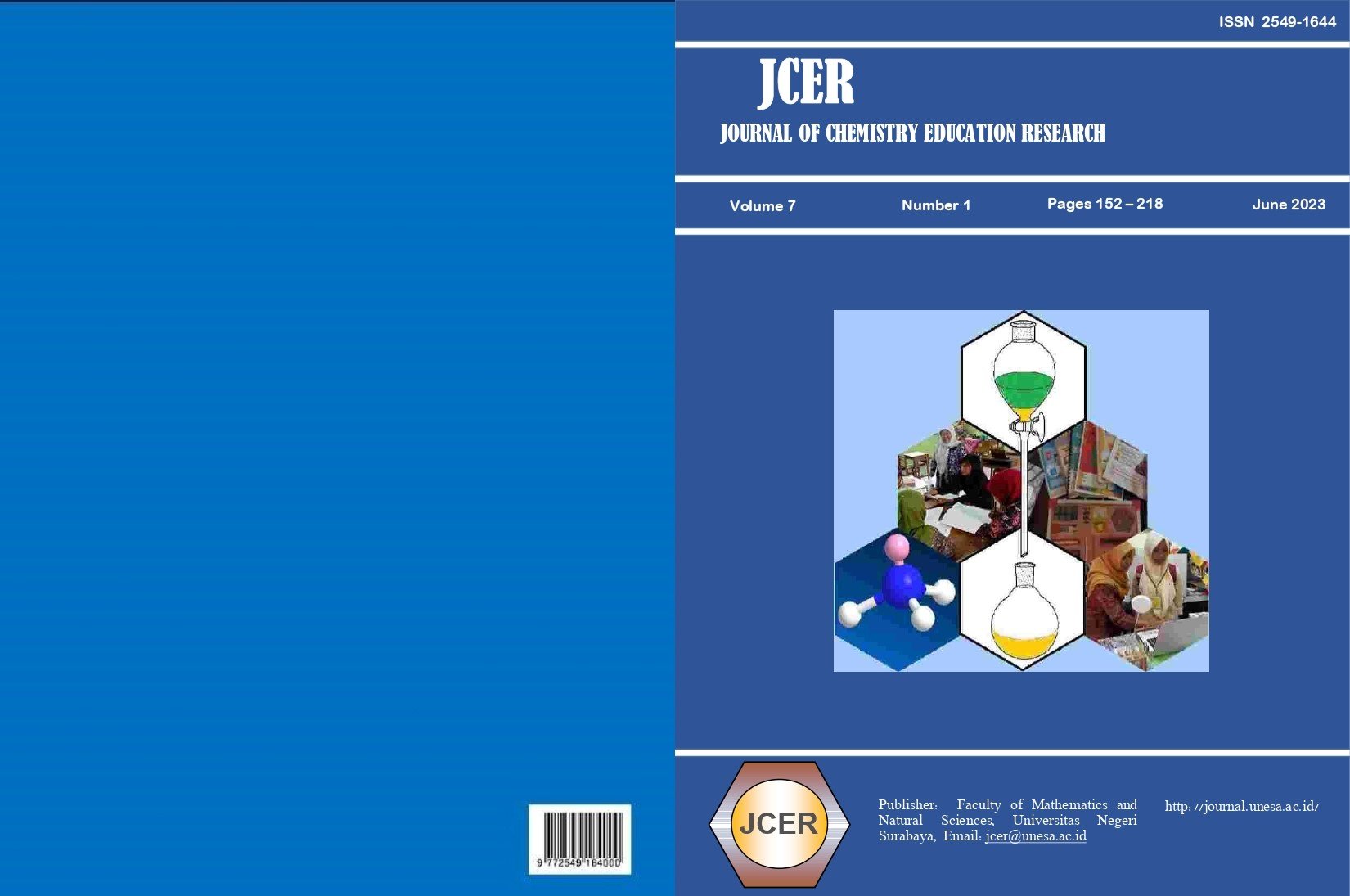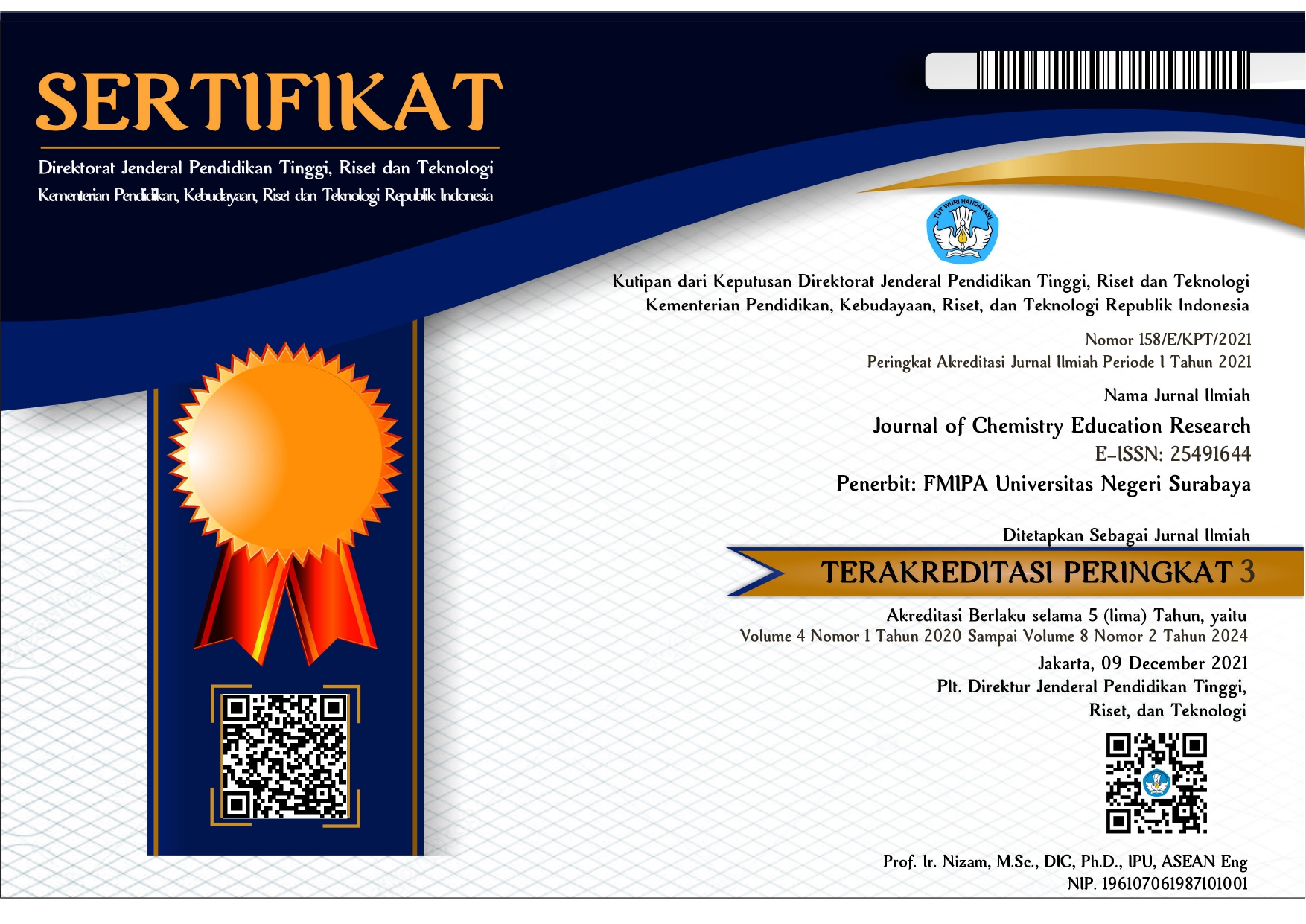THE INFLUENCE OF THE 6-PHASE LEARNING CYCLE - THINK PAIR SHARE LEARNING MODEL ON LEARNING OUTCOMES AND STUDENT RETENTION ON CHEMICAL EQUILIBRIUM MATERIALS
DOI:
https://doi.org/10.26740/jcer.v7n1.p178-185Keywords:
Learning Cycle, Chemical Equilibrium, Retention, Learning OutcomesAbstract
This study aims to decide the influence of the Learning Cycle 6 Phase - Think Pair Share learning model on knowledge results and student retention on chemical equilibrium material. The research design was a quasi-experimental research design without a pretest (posttest-only control group design). All students of class XI MAN 1 Kota Malang were used as the population in this study. The sample selection was carried out using the cluster random sampling technique and 2 research groups were acquired. Class XI MIPA 6 was selected as the experimental class using the Learning Cycle 6 Phase - Think Pair Share learning model while class XI MIPA 5 was selected as the control class using the Learning Cycle 6 Phase. The number of students in class XI MIPA 5 was 36 students, while the amount of students in class XI MIPA 6 was 34 students. The measurement instrument used is a test. The test was carried out after being given treatment to measure students' skills to recognize the concept of chemical equilibrium. In addition, there is a retention test that is held 1 week and 1 month after students study chemical equilibrium material without prior notification. Test the hypothesis to determine whether there was a substantial difference in education outcomes and retention between schoolchildren taught by the 6-Phase Learning Cycle - Think Pair Share learning model and students taught with the 6-Phase Learning Cycle model in chemical equilibrium material with the Independent Sample T-Test. The data analysis technique used consisted of preliminary analysis consisting of a normality test and homogeneity test and analysis of results consisting of hypothesis testing. The outcomes of the Independent Sample T Test showed a likelihood worth of fewer than 0.05 which indicated that there was a substantial difference between the knowledge outcomes of the experimental group and the control group. The probability values of retention tests I and II are also smaller than 0.05. This shows that there is a substantial difference amongst the retention test of the experimental group and the control group on retention tests I and II. The outcomes of this research show that the midpoint knowledge outcomes in the experimental group are higher than the midpoint knowledge outcomes in the control group, namely 77 in the experimental class and 71 in the control class. This proves that the Learning Cycle 6 Phase - Think Pair Share learning model has an effect on student learning outcomes of MAN 1 Kota Malang on chemical equilibrium material. This model also affects student retention.
References
Helsy, I and Andriyani, L., Pengembangan Bahan Ajar Pada Materi Kesetimbangan Kimia Berorientasi Multipel Representasi Kimia, Jurnal Tadris Kimiya 2, 1 (Juni 2017): 104-108, DOI: http://dx.doi.org/10.15575/jta.v2i1.1365
Hermawan, B., A., Wonorahardjo, S., Marfuah, S., Efektifitas Internet dalam Learning Cycle 6E pada Materi Hidrokarbon Ditinjau dari Hasil Belajar Siswa, EduChemia Jurnal Kimia dan Pendidikan, Vol.2, No.2, Juli 2017.
Diah Putu Witaningtyas, I Wayan Lasmawan, Putu Budi Adnyana, 2016, Model Pembelajaran Kooperatif Tipe Think Pair Share Berpengaruh Terhadap Sikap Ilmiah dan Hasil Belajar IPA Siswa Kelas V, e- Journal Program Pascasarjana Universitas Pendidikan Ganesha Program Studi Pendidikan Dasar (Volume 6 Tahun 2016)
Sumiyati, Y., Sujana, A., Djuanda, D., 2016, Penerapan Model Learning Cycle 7E untuk Meningkatkan Hasil Belajar Siswa pada Materi Proses Daur Air, Jurnal Pena Ilmiah: Vol. 1, No. 1 (2016)
Jeharuta, R., R., K., Subandi, Habiddin, 2020, Learning Cycle-6e and Cognitive Conflict Strategies: The Remedial Learning to Overcome Misconceptions, Jurnal Ilmu Pendidikan (JIP), Vol. 26, Issue 1, June 2020, pp. 29-38
Izzati, L., R., Sutopo, Chrisnawati, H., E., 2016, Penerapan Model Learning Cycle 7E untuk Meningkatkan Aktivitas dan Hasil Belajar Matematika Kelas Peminatan XI MIA 3 Semester 2 SMA Negeri 5 Surakarta Tahun Ajaran 2014/2015, Prosiding Seminar Matematika dan Pendidikan Matematika, hal 760-776 November 2016.
Downloads
Published
Issue
Section
License

This work is licensed under a Creative Commons Attribution-NonCommercial 4.0 International License.
 Abstract views: 244
,
Abstract views: 244
, PDF Downloads: 327
PDF Downloads: 327



